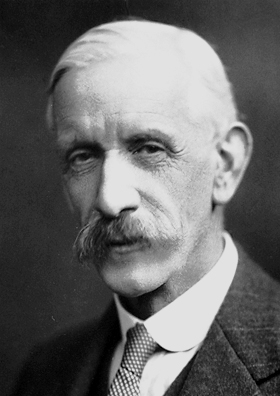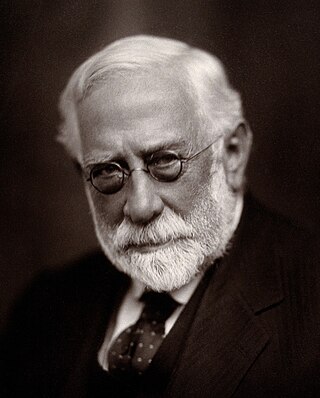Related Research Articles

Sir Frederick Gowland Hopkins was an English biochemist who was awarded the Nobel Prize in Physiology or Medicine in 1929, with Christiaan Eijkman, for the discovery of vitamins. He also discovered the amino acid tryptophan, in 1901. He was President of the Royal Society from 1930 to 1935.

Sir Thomas Barlow, 1st Baronet, was a British royal physician, known for his research on infantile scurvy.

George Udny Yule, CBE, FRS, usually known as Udny Yule, was a British statistician, particularly known for the Yule distribution and proposing the preferential attachment model for random graphs.

Sir Thomas Clifford Allbutt KCB, MA, MD, ScD, FRS was an English physician best known for his role as president of the British Medical Association 1920, for inventing the clinical thermometer, and for supporting Sir William Osler in founding the History of Medicine Society.

Sir Rowland Harry Biffen FRS was a British botanist, mycologist, geneticist and a professor of agricultural botany at the University of Cambridge who worked on breeding wheat varieties. He was also a gifted artist known for his landscapes in watercolours. He was the founder of the Journal of Agricultural Science.

Colonel Sir Thomas Hungerford Holdich was an English geographer and president of the Royal Geographical Society. He is best known as Superintendent of Frontier Surveys in British India, arbiter in the Cordillera of the Andes Boundary Case and author of numerous books, including The Gates of India, The Countries of the King's Award and Political Frontiers and Boundary Making.
The Victoria Medal of Honour (VMH) is awarded to British horticulturists resident in the United Kingdom whom the Royal Horticultural Society Council considers deserving of special honour by the Society.

Dorothy Whitelock, was an English historian. From 1957 to 1969, she was the Elrington and Bosworth Professor of Anglo-Saxon at the University of Cambridge. Her best-known work is English Historical Documents, vol. I: c. 500-1042, which she edited. It is a compilation of translated sources, with introductions.

Sir Joseph Burtt Hutchinson FRS was a British biologist. He was Drapers Professor of Agriculture at the University of Cambridge from 1957 to 1969.
Sir James William Longman Beament was a British scientist who studied insect physiology and psychoacoustics. He has been described as "an international authority" on "the structure and waterproofing of insect eggs".
Sir Frank Leonard Engledow was a British agricultural botanist who carried out research at the Plant Breeding Institute at the University of Cambridge from 1919 onwards. He was a fellow of St John's College (1919–1985), Cambridge, and held the positions of University Lecturer in Agriculture (1926–1930) and Drapers Professor of Agriculture (1930–1957) at Cambridge, where he directed the School of Agriculture from 1930 to 1957. Engledow advised the British government on agricultural production in the (former) colonies as well as in the homeland from 1927 to 1962. He continued to publish on agricultural practices and teaching after his retirement.
The Plant Breeding Institute was an agricultural research organisation in Cambridge in the United Kingdom between 1912 and 1987.
Thomas Barlow Wood was a British chemist and agricultural scientist who researched animal nutrition, published an influential paper on experimental error, and was one of researchers who isolated cannabinol. He was associated with the School of Agriculture at the University of Cambridge almost from its foundation; he held the Drapers' chair of agriculture (1907–29), and the school's prestige grew under his leadership. He also directed the Animal Nutrition Research Institute at Cambridge, served as the first editor-in-chief of The Journal of Agricultural Science (1905–29) and was a fellow of Gonville and Caius College (1908–29). His textbooks include The Story of a Loaf of Bread (1913), Food Economy in Wartime, The Chemistry of Crop Production (1920) and Animal Nutrition (1924). He received the CBE, and was an elected fellow of the Royal Society and the Institute of Chemistry.
References
- ↑ Robert Neild (1 June 2012). The Financial History of Cambridge University. Thames River Press. pp. 43–44. ISBN 978-0-85728-515-7 . Retrieved 17 May 2013.
- 1 2 Paolo Palladino (2003). Plants, Patients, and the Historians: On (re)membering in the Age Genetic Engineering. Rutgers University Press. pp. 44–. ISBN 978-0-8135-3238-7 . Retrieved 17 May 2013.
- ↑ The University of Cambridge: The modern university (1882-1939)', A History of the County of Cambridge and the Isle of Ely: Volume 3: The City and University of Cambridge (1959). pp. 266–306. Retrieved 17 May 2013.
- ↑ University of Cambridge (8 October 2009). Statutes and Ordinances of the University of Cambridge 2009. Cambridge University Press. pp. 854–. ISBN 978-0-521-13745-4 . Retrieved 4 December 2012.
- ↑ E. J. Russell (1930). "Obituary Notice - Thomas Barlow Wood (1869–1929)". Biochemical Journal. 24 (1): 1–3. doi:10.1042/bj0240001. PMC 1254346 . PMID 16744330.
- ↑ Bell, G. D. H. (1986). "Frank Leonard Engledow. 20 August 1890-3 July 1985". Biographical Memoirs of Fellows of the Royal Society. 32: 188–219. doi:10.1098/rsbm.1986.0007. S2CID 72428152.
- ↑ "Sir Joseph Burtt Hutchinson (1902–1988), CMG, SCD, FRS, Drapers' Professor of Agriculture (1957–1969), Fellow | Art UK".
- ↑ "Obituaries - Sir James Beament". The Independent. 2005-03-18. Archived from the original on April 22, 2013. Retrieved 2012-12-04.